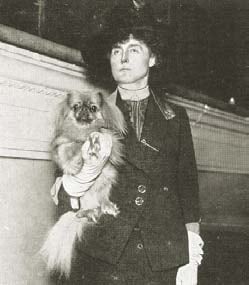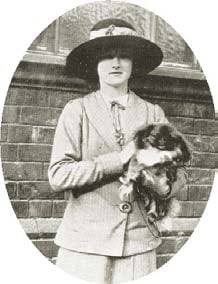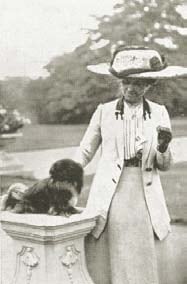A PEKINGESE named after a Chinese nationalist statesman… the height of buffoonery or the peak of good taste?
Evidently, the latter — for there is proof in abundance that the ownership of a Pekingese was regarded as a sign of ‘good breeding’ (among the owners) in the upper echelons of society in 1912.
A peke named Sun Yat Sen survived the wreck of the Titanic when 1,500 indicated higher vertebrates died.
The said Sun Yat, if it is not impertinent to abbreviate, allowed himself to be owned by Henry Sleeper Harper of the Harper Brothers publishing company.
Mr Harper and his wife were travelling in Europe and had opened their wallets in Paris to achieve husbandry of the animal. All three were then booked aboard the RMS Titanic.
J.P. Morgan, owner of the White Star Line, might have been pleased to see Sun Yat Sen embark at Cherbourg, had the Wall Street Croesus not been detained in Aix-les-Bains. Morgan was an unashamed admirer of the breed, and a Pierpont Morgan Cup was given annually at the show of the Pekin Palace Association, an exclusive owners club.
Even the London Times held them in high regard:
”A Pekingese is beyond doubt an extraordinarily fascinating animal. When once a human being has fallen under their spell he never escapes from it. In no other domesticated animal is so much pride and courage and great-heartedness contained in so few inches. Merely to see one of the tiny champions stroll across the judging ring is a delight.
The swagger of him; the alertness and pose of the shapely little body, from the carriage of the lion head to the cock of the cataract tail which falls about his hindquarters like the plume on a field marshal's hat; the ridiculous but justifiable pride; all combine to make him an incomparable creature. No living thing is capable of expressing in its face and bearing so much contempt for the world at large. And when two of them disagree they explode in noises like fireworks.
There are champion dogs which command a stud fee of 20 and 30 guineas; and they only weigh some 7lb. or 8lb. On the benches in the tent in the Hospital Gardens the little tyrants are waited on and brushed and combed and petted by charming women; they loll on dainty cushions and some of them are housed in glass-fronted cases of their own. But they are extremely contemptuous of all.
They are affable, of course, and not above taking an inquisitive interest in strangers. But for the mostpart they regard all the circumstances of their surroundings with the indifference which it becomes Royalty to show towards all earthly accidents.
(The Times, June 6, 1914, p.5)
An unearthly accident we know befell the RMS Titanic, but the Harper household survived the subsequent unpleasantness — albeit in the rough and ruddy embrace of lifeboat number three.
One might naturally anticipate, after such a frightful experience, that a pedigree canine would be desirous of food aboard the RMS Carpathia. It is to be hoped that the gallant little Cunarder’s cuisine was not itself found wanting in this respect.
An article in the Illustrated London News one year after the sinking of the Titanic (April 19, 1913) was entitled Woman’s Cult Of The Dog: No. 1. – The Pekingese. It explained why a Pekingese should unquestioningly be afforded every privilege that life has to offer:—
LADIES WHO HAVE PROFITED BY THE SACK OF A PALACE
“It is a curious fact that the present craze of Pekingese should be due to the sack of an Imperial Palace.
In 1860 the summer palace at Peking was burned by the combined French and English forces. In the residence of the Chinese Emperors a royal breed of dog had existed for a very long time; and though they were little seen outside the royal circles, they were very commonly known by the name of Lion Dogs, and (when very small) Sleeve dogs.
The breed was so exclusively reserved for the Palace that the punishment meted out to anyone taking one away was very severe, such as death by stoning.
According to Lady Algernon Gordon-Lennox, after the sack of the SummerPalace five of these dogs were found in an apartment of the Emperor's aunt, who had committed suicide on the approach of the troops.
The dogs were described as being of a golden sable colour, with black masks and points, and weighing from five to six pounds each. A pair of these dogs was given to the late Duchess of Richmond by a relative, then present in Peking; another pair was brought away by Lord John Hay, one of which he gave to his sister, the then Duchess of Wellington; while the fifth specimen was acquired by General Dunne, who presented it to her late Majesty Queen Victoria.
Thus the Pekingese were first imported into Great Britain about fifty years ago, and since then the breed has been encouraged, until it has reached its present height of popularity.
Mrs Hunloke with “Wingerworth Kou-Kou”, Mrs Clarke owner of “Broadoak Beetle”, Mrs D.K. Wright with “Gunterstone Pu-Wen”
Mrs Hugh Andrews' three dogs “Sih, Gerza”, “Lo Lo” and “Chun-Chu,” of Toddington; Mrs Kennedy, owner of “Nanking Wen-Ti”; Mrs Herbert with “Mai-Mai” and “Yen-Chu,” both of Newnham.
Mrs Calley with “Ko-Tzu”; Miss Ashton Cross with “Choo-Tai” of Egham; Mrs Becher with “Howbury Ming”
As proof of the high esteem in which these pampered favourites were held by their former owners, we must quote some of the "pearls dropped from the lips of her Imperial Majesty Tye Hsi, the dowager-Empress of the Flowery Land," from that excellent little monograph on the breed edited by Miss Lilian Smythe, the Secretary of the Peking Palace Dog Association.
“Let the Lion Dog be small,” says the Empress; “let it wear the swelling cape of dignity around its neck. Let its forelegs be bent so that it shall not desire to wander far, or leave the Imperial Precincts.
“Sharks' fins and curlews' livers and breasts of quails, on these it may be fed. Thus shall it preserve its integrity and self-respect; and for the day of sickness, let it be anointed with the clarified fat of the leg of a sacred leopard; and give it to drink a throstle's eggshell full of the juice of the custard apple in which it has been dissolved three pinches of shredded rhinoceros horn, and apply to it piebald leeches.”
Needless to say, these directions can scarcely be carried out by the dog-fancier of their adopted land.”
Like many of the better individuals who escaped the destruction of a floating palace, Sun Yat Sen was little further seen in society. The animal’s wounded pride amid a sea of indignities may only be guessed upon.
It is also greatly to be feared that his arrival at New York on an impossibly inconsequential (and indeed, salt-caked) single stacker may have unnerved the quadruped for life.
In absence of Sun Yat Sen on the wrong side of the Atlantic in 1914, the Pierpont Morgan Cup for best exhibit at the Chelsea show was awarded to Mrs Calley's “Ko-Tzu,” pictured here. The same dog was also awarded the Gordon Bennett, Braywick and Bagatelle Cups, among 72 cups and prizes awarded in 31 classes.
The namesake Sun Yat Sen, a vulgar politician, died of cancer in 1925.











Comment and discuss